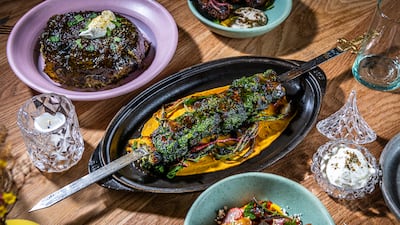Michael Rafidi, a Palestinian-American chef who grew up in Maryland, had little interest in cooking the food of his grandparents for much of his career, leaning more towards classic French and modern cuisine.
But after doing some travelling, including in the Middle East, Mr Rafidi, 38, found a new love for the dishes he ate at home growing up.
“I decided I should get back to my roots,” Mr Rafidi tells The National.
“I thought, 'I want to open my own restaurant, and it should have Palestinian food as the star, and it should incorporate everything I've learnt in this business.'”
In 2020, he opened Albi in Washington as a tribute to his grandparents. But award-winning, upscale Albi is far from a traditional restaurant, and the food he serves is not prepared the way his grandmother – whom he still texts for recipes and advice – would necessarily cook, let alone approve of.
“I am not trying to do verbatim Palestinian food,” Mr Rafidi says. “I grew up here in DC, so this is an American restaurant, but from a Palestinian view.
“It's really my interpretation of Palestinian food.”
At Albi – Arabic for “my heart” – the menu changes frequently and the tasting menu, called the Sofra, or a set table, is “spontaneous”.
Currently on the menu is rockfish wrapped in grape leaves, an appetiser with a locally inspired twist on the traditional dish, which generally uses rice and minced meat.
There is also the Sfiha, a spiced lamb pastry, that is prepared in a rectangular shape and served as a snack, using what Mr Rafidi says is the same blend his grandmother uses, with the same flavour profile.

“Things come and go, there’s a baseline of real traditional dishes that I grew up eating and not all of them made the cut at Albi,” Mr Rafidi says.
“Then there are other dishes that I did an interpretation of, that I modernised.”
In May 2022, Albi received a Michelin star. That same year, Mr Rafidi was a semi-finalist in the James Beard Awards for Best Chef in the Mid Atlantic region. In 2023, he was a finalist in the same category.
“It was incredible and I felt that I got to represent Palestinians as much as I can,” Mr Rafidi says of the experience. Last month, he attended the awards with a keffiyeh wrapped around his shoulders.
Palestinian food, which is similar to other cuisines in the Middle East, includes small, shared plates, as well as heavier dishes that include rice, meat, chicken or fish.
But unlike Lebanese cuisine, for instance, which generations of Levantine immigrants in the US have popularised to great success, Palestinian fine dining is relatively new.
And when Mr Rafidi opened his restaurant at the start of the pandemic, he worried that diners, especially those who were familiar with the traditional flavours and presentation, would not enjoy it.
The issue of infusing Palestinian dishes with non-traditional ingredients is a surprisingly controversial issue, with many believing that it dilutes the authentic flavours and is akin to cultural appropriation.
“It was a huge risk when we opened and I thought that most Arabs would hate what we’re doing,” he says.

Reem Kassis, a Palestinian food writer and author of several books, including The Palestinian Table, says food all throughout history has continuously evolved.
But change is likely happening at a faster pace now, with the near instantaneous exchange of ideas on social media.
“Food continues to evolve, and preserving it is important,” Ms Kassis tells The National.
“Restaurants, pushing the envelope and trying to create something that's more exciting or more visually pleasing, is also great – it doesn't have to be one or the other.”
Ms Kassis says Palestinian food in the US, which had long been eclipsed by the negativity of the Palestinian-Israeli conflict, started to gain popularity several years ago, with the rise of cooking and travel television shows, as well as a growing interest in foreign food on social media.
Palestinian cuisine is now headed towards a new milestone, she says, and it could either become more specific, with restaurants serving up regional dishes, or it could become part of mainstream food in the US.
“Palestinian cuisine would no longer be this exotic thing, it would be, ‘Oh, I'm going to go to the supermarket and pick up this Palestinian salad,’” Ms Kassis says.
Mr Rafidi says Albi, as well as Yellow, his casual cafe located in the trendy Georgetown neighbourhood that serves up shawarma and falafel sandwiches as well as pastries – all with a French spin – are deeply meaningful to him.
“I think there's a soul to Palestinian food,” he said.
“I really wanted to showcase the food I grew up eating because it's incredible and pay a tribute to my grandparents, my family and Palestinians all over the world to eat this food.”


